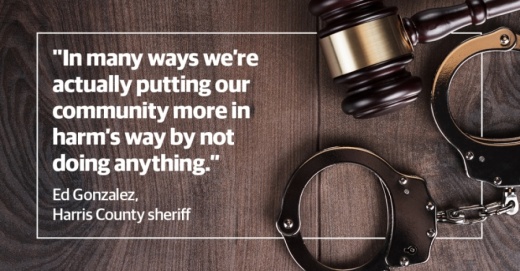Four days later, Hidalgo said the county is now at a crossroads having to weigh the lesser of two evils: releasing nonviolent inmates back into society or risking coronavirus spreading rampant through the county jail and filling the county’s hospital beds.
“The challenge is at the most, in our region, there’s about 4,000 beds that are available, before this whole thing started, in the [intensive care unit,] and so imagine if just a portion of those inmates end up being in ICU. Then, you’re in trouble,” Hidalgo said during the Harris County Commissioners Court meeting April 7. “So right now, we’re in a bit of a standoff.”
According to Harris County Sheriff Ed Gonzalez, as of April 7, Harris County Jail had a population of 7,612, with 6,145 of those inmates being in the pretrial status. As of April 7, three inmates had tested positive for the coronavirus; 52 were symptomatic, presumptive-positive cases; and 1,100 more were under observation, meaning they had been exposed to the coronavirus but were not yet exhibiting symptoms.
As a result, Gonzalez said 30 sheriff's office employees had tested positive for the coronavirus, 20 of whom work inside the jail system.
While Precinct 4 Commissioner Jack Cagle questioned why the sheriff's office was unable to quarantine the jail, similar to how it would be done on a cruise ship, Gonzalez said it was not that simple because of “jail churn.”
“Every day, ... our public safety officers, deputies [and] law-enforcement community partners are still putting people in jail. We want to hold the line and protect our community,” Gonzalez said. “So what happens is you have over 100 people daily that are coming into the mix. We have thousands of employees that come in and out of that same system, and with our fixed space, we can only quarantine so much.”
Gonzalez added that this dilemma is one that jail and prison operators all across the country are currently facing; he said the settings are not conducive for social distancing and are, in fact, ripe for the spread of illness.
“We had three or four people die in this jail during [the] Ebola [crisis],” Gonzalez said. “So far, we’ve had [no deaths from coronavirus], but that doesn’t mean we won’t have one today or tomorrow or that we won’t have an employee that will suffer that fate. Because of the volume [with which] we operate, ... it’s not a matter of if, but when. In many ways, we’re actually putting our community more in harm’s way by not doing anything.”
Cagle said his biggest priorities are protecting both the safety of the community and law-enforcement officers while curbing the spread of coronavirus and protecting the rights of victims.
“I would like to make sure that we are doing everything we possibly can to make sure that if we are going to be releasing someone from our jails, ... we do so in a very responsible way,” Cagle said. “We need to make sure that we’re giving those peace officers all the tools that they have to make sure that they’re not doing their job in vain. I want to make sure that we are giving them the support that they need to make sure that when they are risking their lives and making a stop, they’re not also risking their lives ... with someone who may also give them this COVID-19 virus as well.”
Both Hidalgo and Gonzalez said all candidates who had been considered for release were low-level, nonviolent inmates with no history of violence, who did not exhibit any symptoms of the coronavirus and who had housing to return to upon release, meaning they would not be released into homelessness.
While the county remains at a standstill on the decision, Adrian Garcia, Precinct 2 commissioner and former Harris County sheriff, said the outcome could mean the difference between an "upstanding citizen" or an inmate getting a hospital bed.
“This is an issue that every community across the country is dealing with,” he said. “I think it’s incumbent on us to recognize the fact that we either want your neighbor, your loved one, your family member or staff—anybody who may be infected by COVID-19—to have a place, a decent hospital, to be treated at and not be told to go home because there’s an inmate already there.”





